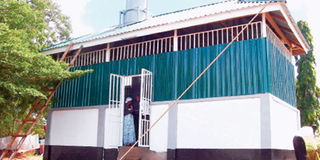IMTU saga -- tip of the iceberg or ?

A standard incinerator facility at Tumbi Hospital in Kibaha District. Inset right shows inside the facility at Tumbi Hospital. Left inset shows the incinerator at IMTU which has reportedly been out of service in recent months. PHOTO | SYRIACUS BUGUZI
What you need to know:
- Most health facilities remain ill-equipped to handle dangerous medical waste, let alone observe the code of ethics guiding the profession
- ETHICS: Such emerging stories are, perhaps, an alarm bell that we are yet to see bigger scandals in the medical sector
Dar es Salaam. The latest saga implicating the International Medical and Technological University (IMTU) for ‘unethical dumping of human organs’ has opened up a whole can of worms in the medical circles, and now, the most pressing question is: How will the IMTU get out of this ethical scandal?
But working to rescue IMTU out of the case will not be a panacea to issues related to improper disposal of sensitive medical materials, as this is a matter of principle and ethics.
Studies done in Tanzania over the past four years reveal that lack of incinerators for disposing medical waste at most medical facilities in Dar es Salaam, and Tanzania at large, is a persistent problem and the latest saga at IMTU could, perhaps be a reminder that ‘improper medical waste disposal is a neglected problem’.
The developing crisis at IMTU has also vindicated the assertion made in a series of articles by The Citizen on Saturday last year, that most health facilities remain ill-equipped to handle dangerous medical waste, let alone observe the code of ethics guiding the profession.
Concerns arose last year at the Muhimbili National Hospital (MNH) -- which holds the country’s largest incineration centre for medical waste -- that a substantial amount of medical waste from certain medical institutions in the city, could not be accounted for.
It emerged, in the survey carried out by The Citizen on Saturday last year that MNH was shouldering the burden of incinerating medical waste from most health facilities but there was a cloud of uncertainty on institutions that could not afford to pay for the services.
Records from MNH’s environmental health department, which were made available to this paper last year, showed that only the most well established institutions could afford to pay for incineration.
‘‘We’re still concerned about those health facilities that don’t have incinerators at their sites or even those that have poor incineration capacity but still never transfer their dangerous medical waste for incineration at MNH. Where does all that waste end up,” queried Mr John Mrema, head of department, last year.
This week’s discovery of body organs in an unofficial dump in Bunju Bonde la Mpiji on the outskirts of the city seems to clear the uncertainty, and, there is no doubt now, after the Dar es Salaam special zone Commander Mr Suleiman Kova confirmed that the dumped body parts were remains of dissection experiments at IMTU.
Students at IMTU who convened at the campus this Thursday, protesting against the possible closure of their university following the unethical dumping of the human body parts revealed yet, that the problem had been billing up for months before last week’s scare at Bunju.
It emerged that the university had been struggling with an ill-equipped incinerator, according to a letter written to the varsity’s administration on 15th June this year and seen by The Citizen on Saturday this week but now, the worrying question is: what of the other facilities that still suffer the same problem as IMTU?
A study done in Dar es Salaam within the past four years now, has exposed shocking revelations of a slackened system of hospital waste management--warning that the city urgently needed a waste processing centre which would collect and incinerate all sharp and infectious waste.
Titled, ‘Current status of sharps waste management in the lower-level health facilities in Tanzania’, one study published in the Tanzania Journal of Health, revealed that the situation was worse in 135 facilities of Ilala Municipality.
“Sharp waste management is a major problem in most lower level health facilities in Ilala Municipality and the rest of the country due to its ever growing and endless generation of such waste coupled with poor management,” reads the study in part.
But the problem seems not to find a remedy. Four years since the study was published, cases of very sensitive human organs going beyond the confines of hospitals are still a concern in the city and one health Centre in Dar es Salaam was on spotlight two weeks ago for the same issue.
According to a survey carried out a few weeks ago by The Citizen’s sister paper, Mwananchi, there were cases of women being discharged with their after-birth (placenta) at certain health facilities in Dar es Salaam—raising more questions on the ethical considerations in preserving sensitive human organs.
When interviewed, a medical officer in one of the facilities who preferred anonymity admitted to Mwanachi newspaper that there was a problem with their incinerator and they had apparently opted to bury the medical waste at an open dumping place in Magomeni in the city.
Such emerging stories are, perhaps, an alarm bell that we are yet to see bigger scandals arising from unethical disposal of human organs and other medical waste, if no urgent measures would be taken to address the situation.




